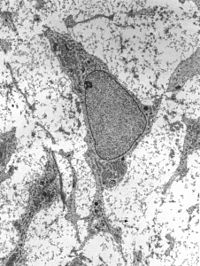
Photo from wikipedia
A human induced pluripotent stem cell line (GPCCi001-A) created by our group was differentiated towards chondrocyte-like cells (ChiPS) via monolayer culturing with growth factors. ChiPS are promising because they have… Click to show full abstract
A human induced pluripotent stem cell line (GPCCi001-A) created by our group was differentiated towards chondrocyte-like cells (ChiPS) via monolayer culturing with growth factors. ChiPS are promising because they have the potential to be used in tissue engineering to regenerate articular cartilage. However, their safety must be confirmed before they can be routinely used in regenerative medicine. Using microarray analysis, we compared the ChiPS to both GPCCi001-A cells and chondrocytes. The analysis showed that, compared to both GPCCi001-A cells and chondrocytes, the expression of genes engaged in DNA damage and in the tumor protein p53 signalling pathways was significantly higher in the ChiPS. The significant amount of DNA double strand breaks and increased DNA damage response may lead to incomplete DNA repair and the accumulation of mutations and, ultimately, to genetic instability. These findings provide evidence indicating that the differentiation process in vitro places stress on human induced pluripotent stem cells (hiPSCs). The results of this study raise doubts about the use of stem cell-derived components given the negative effects of the differentiation process in vitro on hiPSCs.
Journal Title: PLoS ONE
Year Published: 2018
Link to full text (if available)
Share on Social Media: Sign Up to like & get
recommendations!